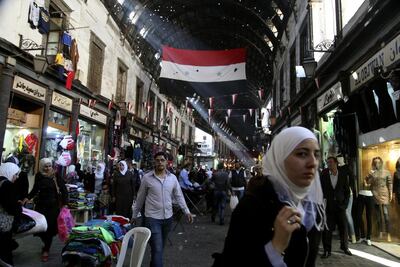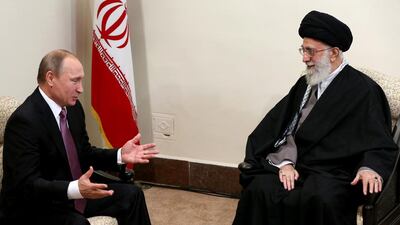Some believe that the much-anticipated nuclear deal between Iran and western powers, Russia and China will diminish Iran's regional influence. But those who think that is the case ignore the huge implications of Tehran's trilateral relationship with Moscow and Beijing. Indeed, there is always the possibility, according to another school of thought, that any lifting of sanctions on Iran as a result of the deal could release a financial windfall that will only bolster Iranian projects and ambitions in the Middle East.
Iran's close relationship with Russia and China – which includes political, military and economic co-operation – could turn it into a regional hegemon, more determined and violent in its quest to impose its system and ideology beyond its borders, especially in Iraq, Syria and Lebanon.
Last week, all the players involved in talks with Iran stepped up their rhetoric and taken important strategic steps. American civilian and military officials revealed new security policies in the Middle East, and confirmed that US troops would remain in the region, albeit with adjustments to their areas of deployment. The US reassured its allies in the region, and affirmed its ability to project power rapidly beyond its bases to confront Iranian threats using "smart" methods.
For its part, the Iranian leadership flexed its military muscles on the field. And a phone call between Russian President Vladimir Putin and Iranian President Ebrahim Raisi carried a deliberate message that the two countries are discussing signing an agreement similar to the 25-year pact signed between Iran and China, to complete a strategic Chinese-Russian-Iranian trilateral that could be further developed, depending on how regional dynamics with respect to the US, Israel and Arab states progress.
The agreement between Iran and Russia is not expected to be on the same scale as the Chinese-Iranian pact, but it has interesting implications, for example in Syria. The Russian and Iranian presidents agreed to step up their efforts to complete the deal possibly before the year ends. The treaty could last for years, and cover military, energy and political co-operation.

Iran would benefit a great deal from this. Indeed, while the pact with China has had precious military and economic benefits for both sides (including in the area of oil exports), a comprehensive agreement with Russia would have the added value of Russia’s deep political involvement in the Middle East. That could come in handy in Iran’s regional projects. Iranian influence in Syria, for instance, requires deep co-operation with Moscow. In Syria, the Kremlin possesses the keys to Syria’s leadership through President Bashar Al Assad, while Iran possesses the keys to controlling Syria’s territory. One question is, who in Syria leads and who follows, Russia or Iran? As a result of the major agreements such as the one being drafted between Russia and Iran, part of the answer will lie in the shared objectives and partnership on the battlefield.
Both Iran and Russia also face a changing dynamic in Syria, in the form of changes in US policy and openness within Arab states to the possibility of welcoming Syria back into the Arab League. By bringing Syria back into the fold, Arab states have two things to gain. They can counter Iran’s overwhelming influence there and, by extension, preserve Syria’s Arab identity; and they can capitalise on Iran’s inability to finance the country's reconstruction, a necessary condition for Syrian stability, and strengthen Arab regional economic links.
Incidentally, Russia may not actually mind the reduction of Iranian influence in Syria. Its main priority is to pursue whatever path secures Al Assad's position and influence the most. But it is willing to entertain an Iranian role in the country for now, in case that turns out to be the best way forward.
Of greater significance, perhaps, is a more direct face-off with the US elsewhere in the region. Even in this regard, Iran's alliance with Russia is paying dividends.
Over the weekend, the administration of US President Joe Biden launched its comprehensive approach to security policy in the Middle East, during Defence Secretary Lloyd Austin’s speech at the Manama Dialogue in Bahrain. The speech echoes recent remarks by US Central Command chief Frank McKenzie, at the National Council for US Arab Relations, in which he confirmed that Washington does not intend to end “our permanent military presence in the region [that] has been guaranteed for more than 70 years”. The Pentagon has also stressed that Iran’s continued threats require vigilance, and that protecting international waterways is imperative.
But at the same time, the Biden administration argues, again, that a "smart" way should be found to confront Iran’s continued security threats. This language sees to acknowledge a belief in Washington today that there is no military solution to the threats from Iran and its proxies. This is the fundamental difference between Mr Biden's approach and that of his predecessor, Donald Trump. Mr Biden’s team do not want to use military language, whether to deter or to respond.
All of this sets the stage for – and describes the psychology of – the important round of the nuclear talks with Iran, which resume on 29 November in Vienna.
The Biden administration's messaging in Manama is likely meant to reassure its partners in the Gulf, and soften the blow for a more generous offer Washington may make soon to Iran as part of the forthcoming nuclear deal. In Vienna, after all, the US side will find it hard to raise the issue of Iran’s regional activities – Iran objects to this being part of the discussion, and it is backed strongly by Russia and China in that objection.
It is already becoming clear that Mr Biden wants neither escalation nor confrontation with Iran. And the more that Iran embeds itself in its alliance with Russia and China, that more likely Mr Biden is to continue that approach.


